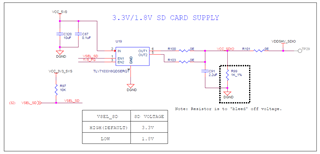We are trying to integrate Murata's 2XS module (Based on NXP's 88W9098 Wi-Fi/BT combo IC) over SDIO interface with AM62X-SK. We are using MMC1 interface (SD card slot) for interfacing Wi-Fi card with help of M.2 to uSD convertor. The SDIO card operates at 3.3V VDD and 1.8V VIO to support UHS1. I believe the default device tree of AM62X-SK also reflect this with vmmc-supply and vqmmc-supply properties under sdhci1 node as follows.
&sdhci1 {
/* SD/MMC */
vmmc-supply = <&vdd_mmc1>;
vqmmc-supply = <&vdd_sd_dv>;
pinctrl-names = "default";
pinctrl-0 = <&main_mmc1_pins_default>;
ti,driver-strength-ohm = <50>;
max-frequency = <50000000>;
disable-wp;
};
I am getting error several times as follows when the Wi-Fi SDIO card is inserted on to the slot but SD card is working perfectly fine.
"mmc1: error -110 whilst initializing SDIO card"
"mmc1: error -110 whilst initializing SDIO card"
"mmc1: error -110 whilst initializing SDIO card"
"mmc1: error -110 whilst initializing SDIO card"
"mmc1: error -110 whilst initializing SDIO card"
Queries:
1. Do we need to do any special configuration for the MMC1 to support SDIO? If yes how to do the same?
2. If not, I suspect the issue may be due to improper clock configuration. Could you please guide towards some pointers that could resolve this timeout error (-110) ?


